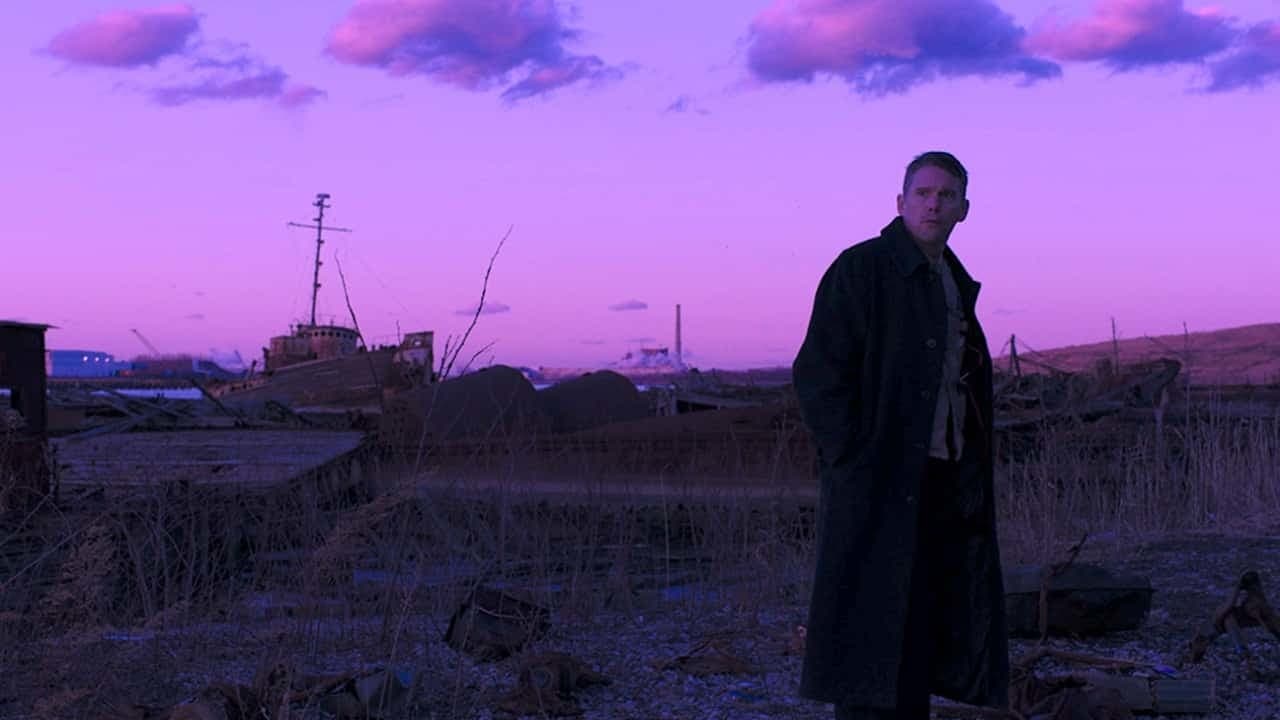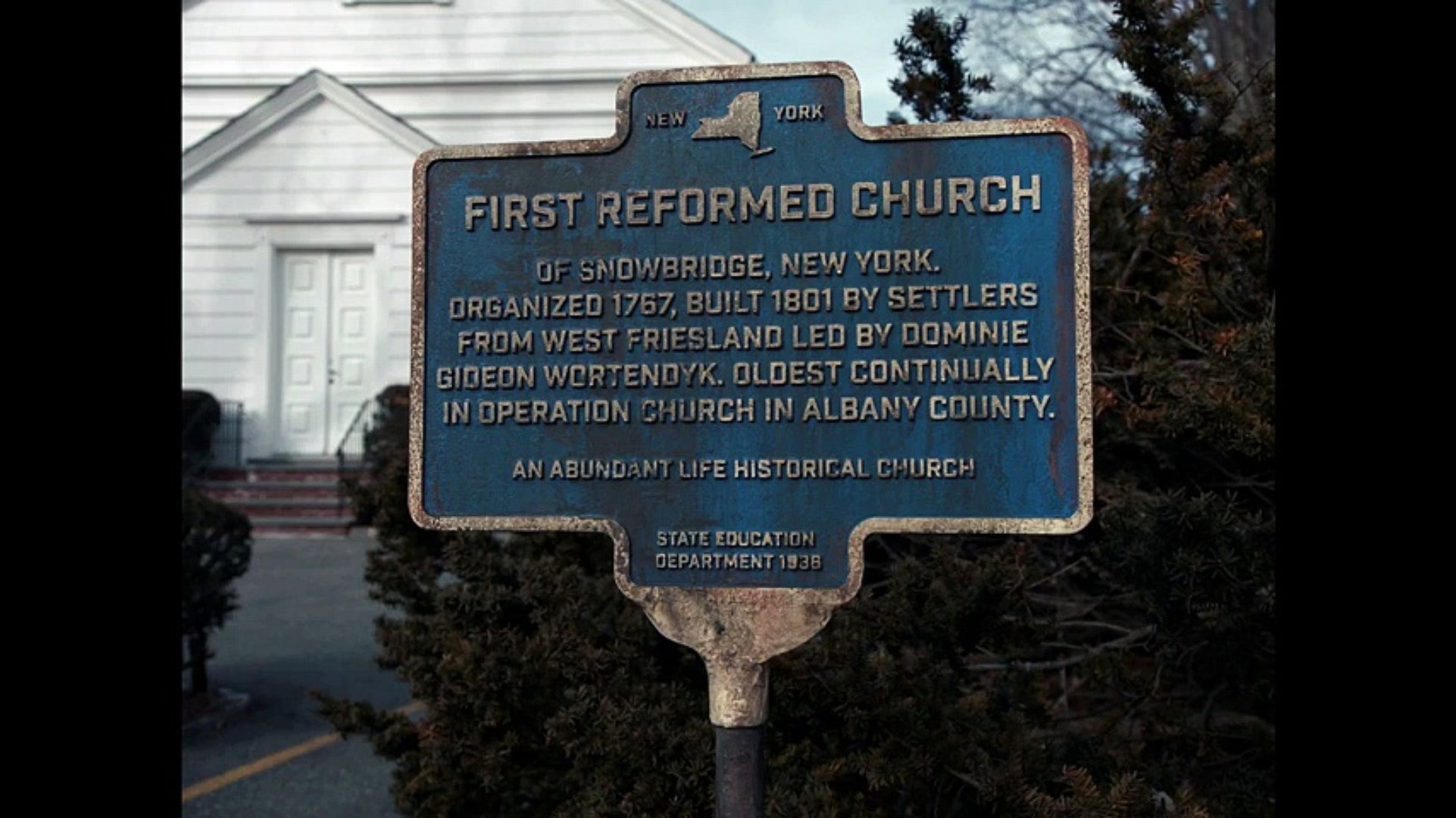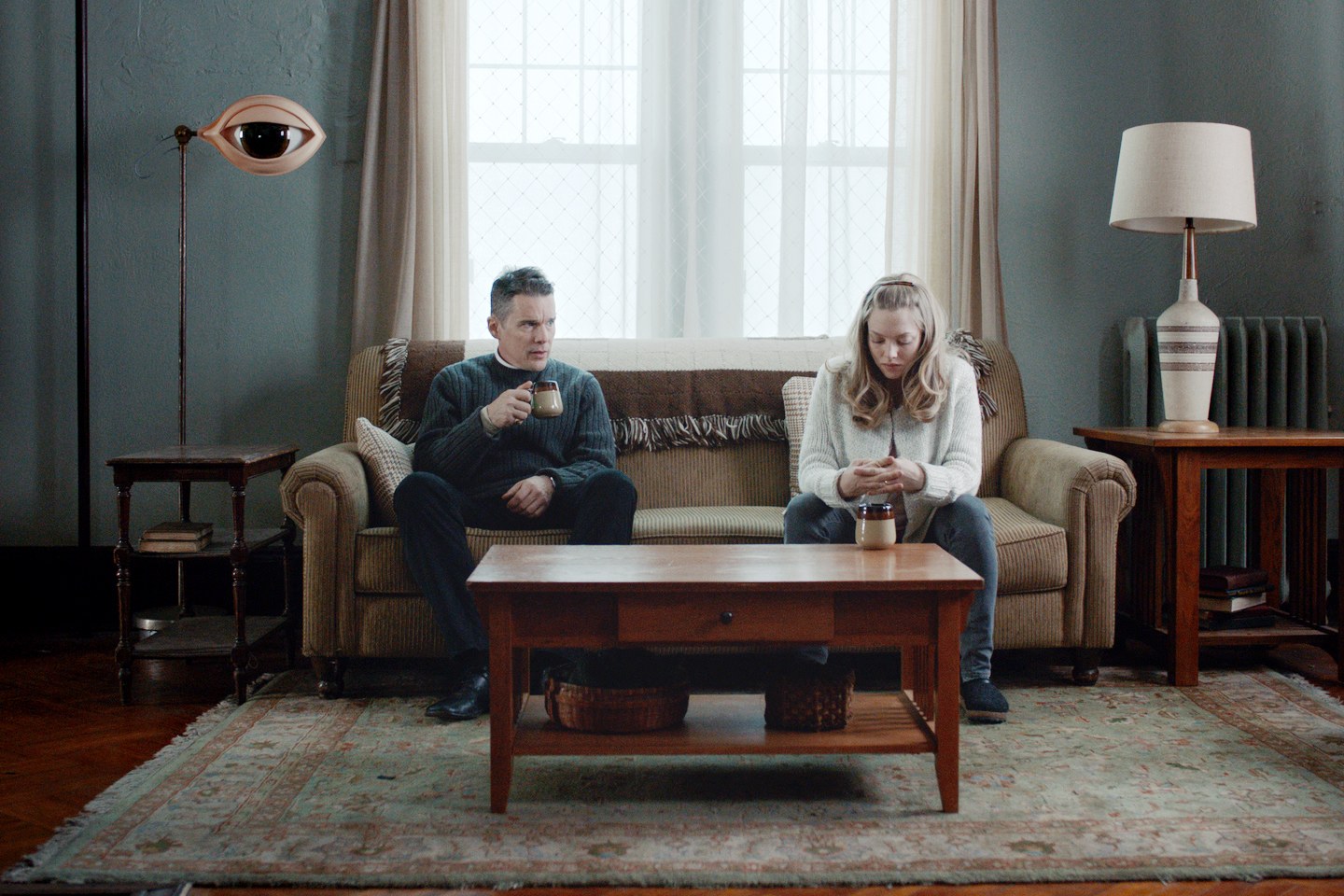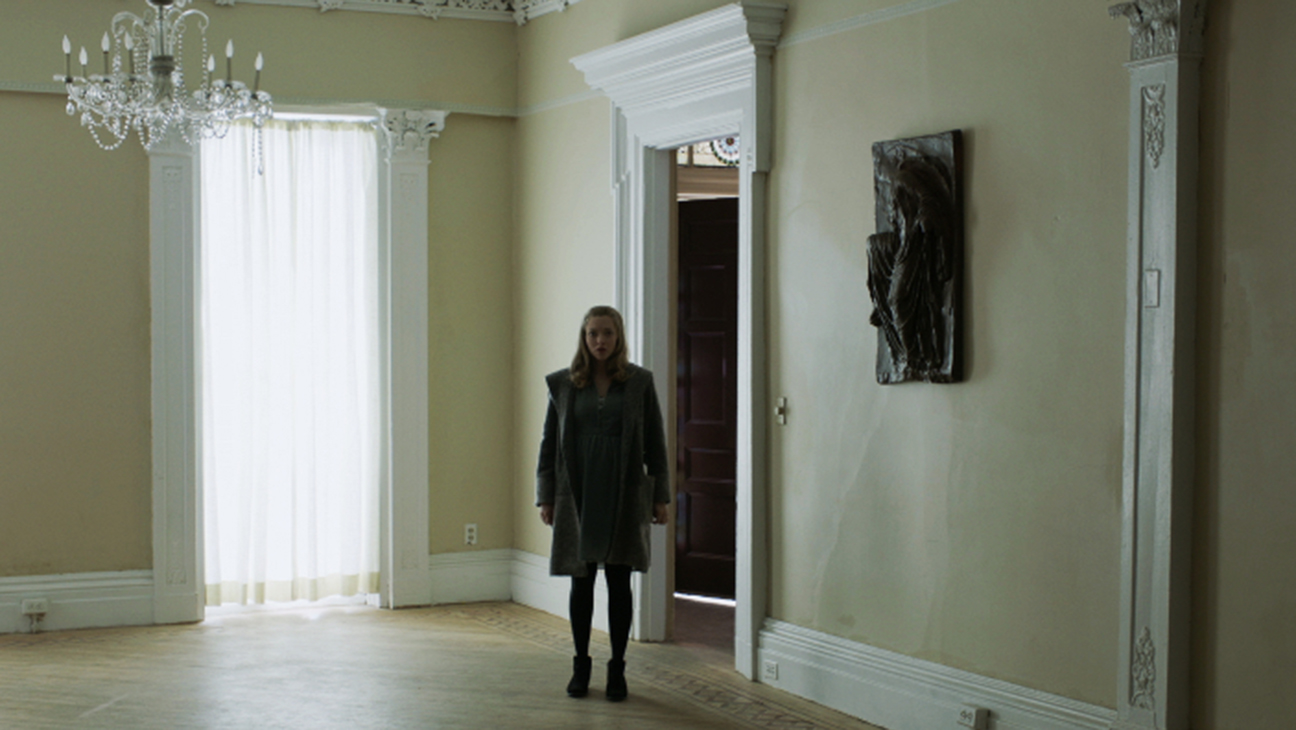Paul Schrader’s bracing, bruising First Reformed is the filmmaker’s most urgent offering in years, and one of 2018’s best. A warped retelling of Bresson’s Diary of a Country Priest filtered through Schrader’s trademark fixations, First Reformed focuses on something curiously absent from contemporary stories, even as it animates many moments of our public and private lives: despair at climate change, and almost paralyzing anxiety over the world we leave behind.
For Schrader and First Reformed, this is an old religious and existential question made all-too-new by the science: will God forgive us for what we’ve done to His Creation? And how are we supposed to choose between courses of action in the absence of instruction from above? Ethan Hawke plays Reverend Toller, a man tending to a dwindling congregation in a historic New York church that may as well be a museum, an adjunct to the hollow capitalism of its neighbor and patron, the mega-church Abundant Life. Amanda Seyfried plays Mary, a pregnant local who seeks his guidance for herself and her activist husband.
With First Reformed new to Blu-Ray and DVD this week, the Luddite Robot team — incidentally, a seminarian and a lapsed Catholic — discuss the film’s themes and techniques, its film-history echoes, and its controversial ending.
(Spoilers to follow)
Liz: So, Rick, First Reformed. I think I first heard about this when you reviewed it in April, and it joined the massive list of things that people have told me I really need to watch-read-listen to, since I’m in seminary and I care about art. And for once, something made it off that list! (Sorry, Leftovers, you’re probably not going anywhere.)
And really, sincerely, I was shocked by this movie. I should have expected it from Paul Schrader, I guess, but I was expecting something much more polite, something more Marilynne Robinson than this. This is a film that takes very seriously the way the world is and the very real difficulties that having faith offers – and it rang really true to me, frankly. I might even say it’s exactly what I was looking for right now.
But anyway: I know we have a whole review, but do you mind saying what you thought of it again?
 Rick: Sure. I first saw First Reformed at the San Francisco International Film Festival, and excitedly wrote it up immediately afterwards. I was impressed by its seriousness, by the grace of its formal elements and its pretty ostentatious callbacks to influences like Dreyer and Bresson, by Ethan Hawke’s craggly, desolate-moon face in close-up. Schrader was in attendance, too, and held court for a good hour post-screening, providing the kind of raspy, quasi-academic master-class you’d expect from a guy who titled his book Transcendental Style In Film. I loved it.
Rick: Sure. I first saw First Reformed at the San Francisco International Film Festival, and excitedly wrote it up immediately afterwards. I was impressed by its seriousness, by the grace of its formal elements and its pretty ostentatious callbacks to influences like Dreyer and Bresson, by Ethan Hawke’s craggly, desolate-moon face in close-up. Schrader was in attendance, too, and held court for a good hour post-screening, providing the kind of raspy, quasi-academic master-class you’d expect from a guy who titled his book Transcendental Style In Film. I loved it.
But, if anything, First Reformed has only grown in my estimation since then, and I’m happy to return to it. I think the questions it raises — about faith, duty, and despair — are vital, and rare in American film. That it centers these impolite questions in the context of climate change is so important and strikes so close to the bone, at least for me. Subsequent viewings have left me wondering less about esoteric issues like its indebtedness to film history, and more about why the greatest threat to continued existence on the earth isn’t the explicit subject of more of our art. (If I’m being honest, sometimes I wonder why it is we talk about anything else.)
Liz: It really is the first movie I’ve seen that truly did something incredible with climate change. It makes it a transcendental theme, something that is a conveyer of meaning and character development, without lessening the realness of it in any way. I feel like that’s the danger, that it can become just another theme, but it’s not just another theme here. Turning it into something broader also makes First Reformed even more political, because we see global warming as the specific effect of something even more inescapable.
 I really relate to the despair of this movie. Honestly, I think most art about “faith” in a liberal or post-liberal world or whatever treats it as something of a hobby, essentially: one believes in something, and it’s kind of a weird little quirk that should be protected or that is valuable because it gives life meaning or whatever.
I really relate to the despair of this movie. Honestly, I think most art about “faith” in a liberal or post-liberal world or whatever treats it as something of a hobby, essentially: one believes in something, and it’s kind of a weird little quirk that should be protected or that is valuable because it gives life meaning or whatever.
But there’s no sense of that here, which I respect. I don’t think this is a movie about the presence of God or the absence of God or anything quite like that; it’s about something totally orthogonal to all of that, to use a pretentious word.
And the use of digital is really striking – I feel like few movies have used digital better from a thematic perspective, particularly in the nature scenes. What do you think of all of that?
Rick: Absolutely. The famous prayer associated with Rev. Toller’s hero, Thomas Merton, begins, “My Lord God, I have no idea where I am going,” not exactly the hallmark of some kind of post-liberal hobby spiritualism. (Toller will paraphrase Merton again: “I believe that the desire to please you does in fact please you” becomes “The desire for prayer is itself a form of prayer.”) There’s a sense of full-body commitment to unknowability in all of Toller’s actions, and the despair that comes along with that, literally leaking out of him. (He’s an extraordinarily leaky guy.)
And First Reformed repeatedly contrasts this devotional struggle — “You’re always in the Garden,” Rev. Jeffers, his patron, tells him; “even Jesus wasn’t always in the Garden” — with the capitalist endeavors of Jeffers’ friendly megachurch-next-door, Abundant Life. The question of how to behave in the world — to do God’s will, in the absence of divine guidance — is a particular variant of a much older existentialist quandary. First Reformed really makes you feel its full weight.
How do you, as a seminarian, relate to all of this?
Liz: Well, if I’m completely honest, it’s a little weird. My seminary is really two little seminaries squished together, and there are a lot of approaches there, but now that I see it on a daily basis and don’t just hear about it as a conservative bugbear, the “spiritual but not religious” thing really bugs me. It seems to me to reduce religion just to a tone of voice and a certain way of saying “hmm” at the right times – just so boring.
This is, to me, a very religious movie, not a spiritual one. If anything, the world is very un-spiritual. That’s what I was trying to say about the digital cinematography, and the unbelievably ugly megachurch we see a few times: these are not spiritual spaces, there’s no luminescence to be found.
People in ministry talk a lot about not having answers, but I think it’s mostly just that they don’t like having questions that much. This really is a movie without any answers, I think. It threatens sometimes to turn into a “love conquers all” kind of story, but I don’t think it ends up doing that, which I appreciated.
Speaking of, what did you think of Amanda Seyfried?
 Rick: I think she’s wonderful in it. She brings a kind of casual groundedness to the narrative, an “earthiness” which is obviously part of her role as First Reformed’s “Mary”. But as someone grappling with things as much as anybody in the narrative, she conveys direct modes of engagement that are welcome respites from Toller’s self-lacerations. This could easily turn into gendered cliche — bike-riding and the curative, God-given power of exercise! Embodied communion as hope! — but I don’t think it does: Seyfried carries herself very much like the sometimes-activist she portrays, the kind of person who does describe herself as “spiritual” in the film, who returns to churches in strange towns out of habit and some unnamed desire. I think of her response when Toller blames himself for the suicide: “He just didn’t want to live.” Sometimes, there’s not much else to say.
Rick: I think she’s wonderful in it. She brings a kind of casual groundedness to the narrative, an “earthiness” which is obviously part of her role as First Reformed’s “Mary”. But as someone grappling with things as much as anybody in the narrative, she conveys direct modes of engagement that are welcome respites from Toller’s self-lacerations. This could easily turn into gendered cliche — bike-riding and the curative, God-given power of exercise! Embodied communion as hope! — but I don’t think it does: Seyfried carries herself very much like the sometimes-activist she portrays, the kind of person who does describe herself as “spiritual” in the film, who returns to churches in strange towns out of habit and some unnamed desire. I think of her response when Toller blames himself for the suicide: “He just didn’t want to live.” Sometimes, there’s not much else to say.
I agree about the digital cinematography lending a particularly grotesque sheen to Abundant Life, both facade and interior: there’s something particularly awful about its cafeteria. I think I momentarily felt my soul diminish from watching people eat there. Schrader and his cinematographer Alexander Dynan (who also shot 2016’s notably grimy Dog Eat Dog) pull off kind of a neat trick here, in terms of inserting the unmistakably digital images into a 1:33 aspect ratio. It feels like a movie out of time, which is appropriate.
Liz: Yes, there’s a good contrast between the scope of the images and the lack of widescreen. It’s almost as if the camera is deciding these nature images don’t deserve widescreen.
I don’t think it’s quite a gendered cliche, but only because I think the film is aware that that’s the framework Toller is thinking of. (He’s talking to a woman when he gives his “you are a burden to me” speech, right?) It’s the negative side of this character, the part that feels a little exhausting towards the end — on purpose, of course — that he is trying to take on himself all the guilt of the dying planet. And, I don’t know, I guess I felt a little distance from all of it in its final moments, with the barbed wire and with Mary rushing in just in time. I know that’s not accidental, that we aren’t supposed to necessarily agree with the characters one-to-one, but the last moments did disappoint me a little. But with a movie like this, I’m not sure there’s any other way to end it.
Rick: I suppose we should just tackle it! How did you interpret those final moments?
They led to some consternation in the audience I first saw it with (and my girlfriend Carrie’s “Whaaat?” on this most recent viewing seemed to echo that sentiment). It seems to me in pretty specific dialog with Schrader’s most famous script, Taxi Driver, another portrait of despair, with another of “God’s Lonely Men” flirting with a cleansing violence. And it, too, ends with a certain amount of ambiguity, or at least cynicism. (The parallels to Taxi Driver could probably constitute a whole treatment in and of themselves, but for brevity’s sake, I’m just thinking of the ending here.) Carrie, for one, hoped for a climactic non-violent act that would strike back at the despoilers of the earth, and we sure don’t get that. But what is it we do get?
 Liz: Honestly, to contradict what I said before — because I mostly really did like this movie and I feel bad saying this, and also, I do not like 90 percent of narrative endings — it felt like a dull cop-out, about heterosexual personal love overcoming the political and philosophical anxiety and dread. I would like to see something else in it, but I just feel like there wasn’t that much there. But I didn’t really think of it in terms of Taxi Driver or anything, so I’m sure you have a much more interesting take.
Liz: Honestly, to contradict what I said before — because I mostly really did like this movie and I feel bad saying this, and also, I do not like 90 percent of narrative endings — it felt like a dull cop-out, about heterosexual personal love overcoming the political and philosophical anxiety and dread. I would like to see something else in it, but I just feel like there wasn’t that much there. But I didn’t really think of it in terms of Taxi Driver or anything, so I’m sure you have a much more interesting take.
Rick: Well, I don’t know about that! Schrader is on record as saying he doesn’t know what it’s all about either, exactly — always the best position for a creator to take. I brought up Taxi Driver mainly because of the very intentional ambiguity: just as we’re never quite sure whether Travis Bickle’s white-knightism is a dying man’s fantasy, First Reformed leaves open the possibility that Rev. Toller drinks the Drano and dies on the floor, dreaming of salvational love, which would be a much more cynical take. (Elsewhere, Schrader deploys an atypical jump-cut when Toller is suiting up, just as Scorsese did as Travis arms himself, and zooms in, twice, on bubbles in drinks, visually calling to mind Bickle’s Alka Seltzer tablet … itself a reference to Carol Reed’s hallucinatory, beer-bubble set-piece in Odd Man Out. But we’re getting lost in the Garden …)
In the end, I’m not sure how much it matters whether it’s narratively true, a meta-narrative commentary on his psychology, or an Ordet-like explosion of transcendence of the mundane. As you said, First Reformed isn’t the kind of film that’s interested in providing pat answers, so there’s no reason to expect its climax would. It’s all just interesting to me.
But we should wrap this up. You mentioned that, caveats aside, this was exactly the sort of movie you were looking for right now. What do you imagine will stick with you?
Liz: There are a couple of perfectly ambiguous nature scenes that really capture the power of nature without being romantically “beautiful”, that really stuck in my brain, but more than anything else here Schrader knows how to shoot the quiet stupid banality of a megachurch. What about you?
Rick: First of all, we really don’t appreciate Ethan Hawke enough. He’s a few years older than me, but in a certain sense I feel like I’ve grown up with him — a sense reinforced, of course, by his repeated, time-lapsed collaborations with Richard Linklater. But more generally, his career progression from embodiment of Gen-X smugness to wounded maturity is a marvel, with the earlier roles informing the way we receive the later ones. As Keith Phipps recently wrote, he “rather unexpectedly” became one of my favorite actors, and First Reformed makes inspired use of his particular mode of sorrow. There’s no irony left here, and its absence raises the depressive stakes.
But the main thing for me is the brute fact of First Reformed as an utterly naked, rigorous grappling with climate change. It’s something deeply personal that is being articulated here, something I haven’t seen. Living in a part of the country where, for instance, air quality warnings on the basis of wildfires are now how we start our days, climate change is less and less an esoteric question on any level. The cavalcade of professional skeptics and paid industry shills are more or less in the rear-view; Carrie’s work, for instance, involves modeling species migratory patterns on the basis of fundamental environmental changes, changes for which we are responsible and which we are doing nothing, less than nothing, to mitigate. The great scene in First Reformed, in which Toller and the activist debate hope and despair, trying to square scientific facts with the unknowability of “the mind of God,” provided me with a glimpse into my own internal dialogues, projected back at me. Even without answers — especially without answers — I’ll remember First Reformed for knowing me so well.

